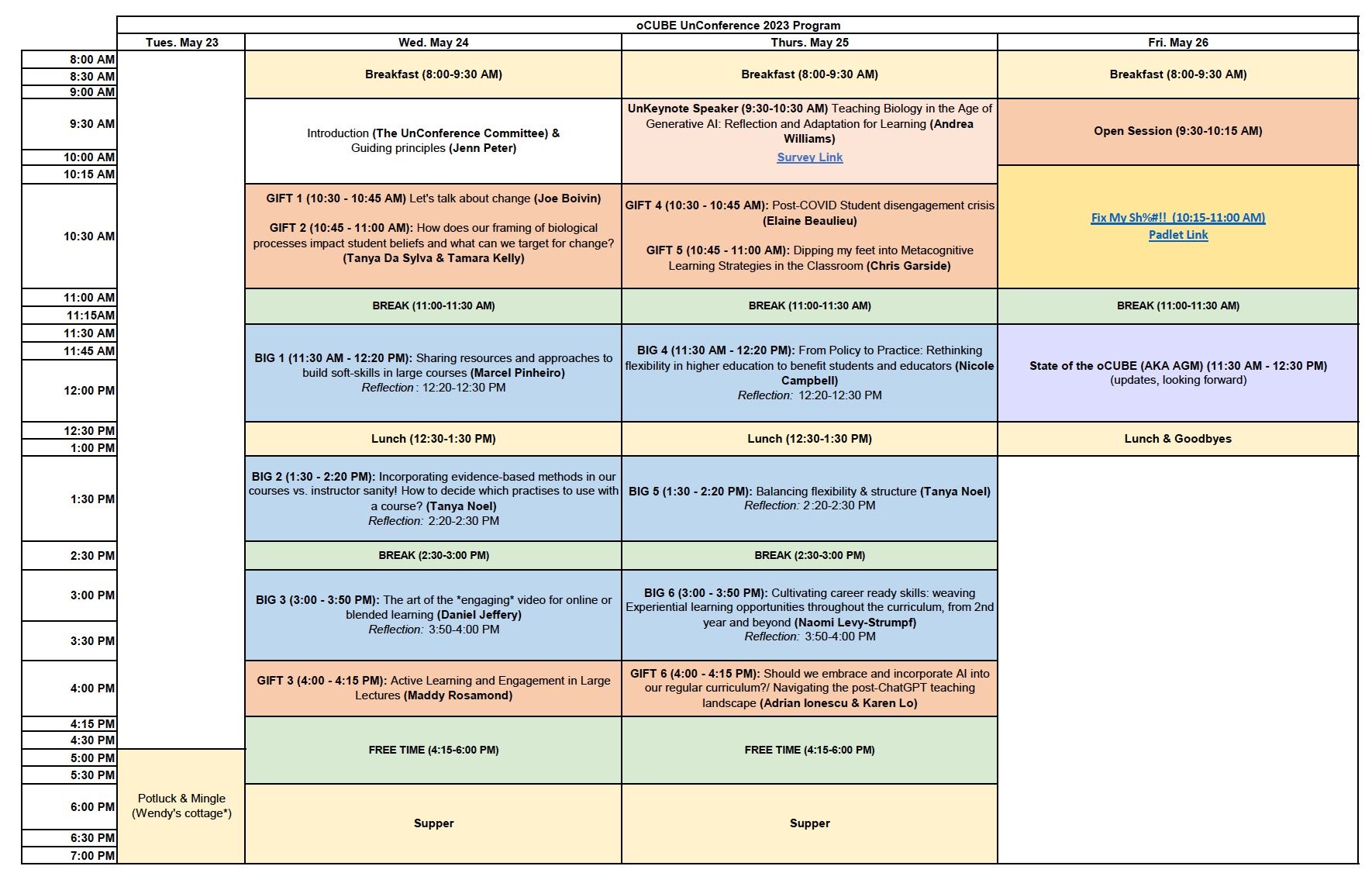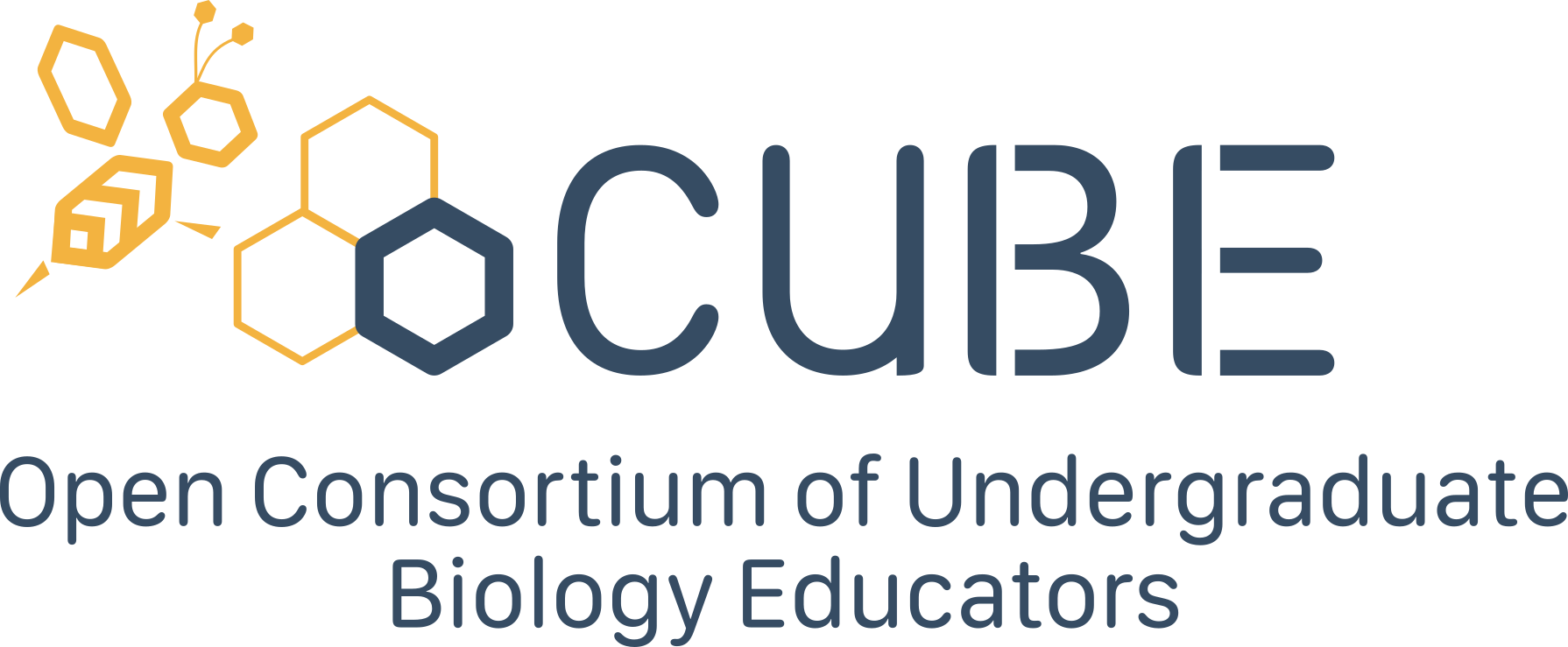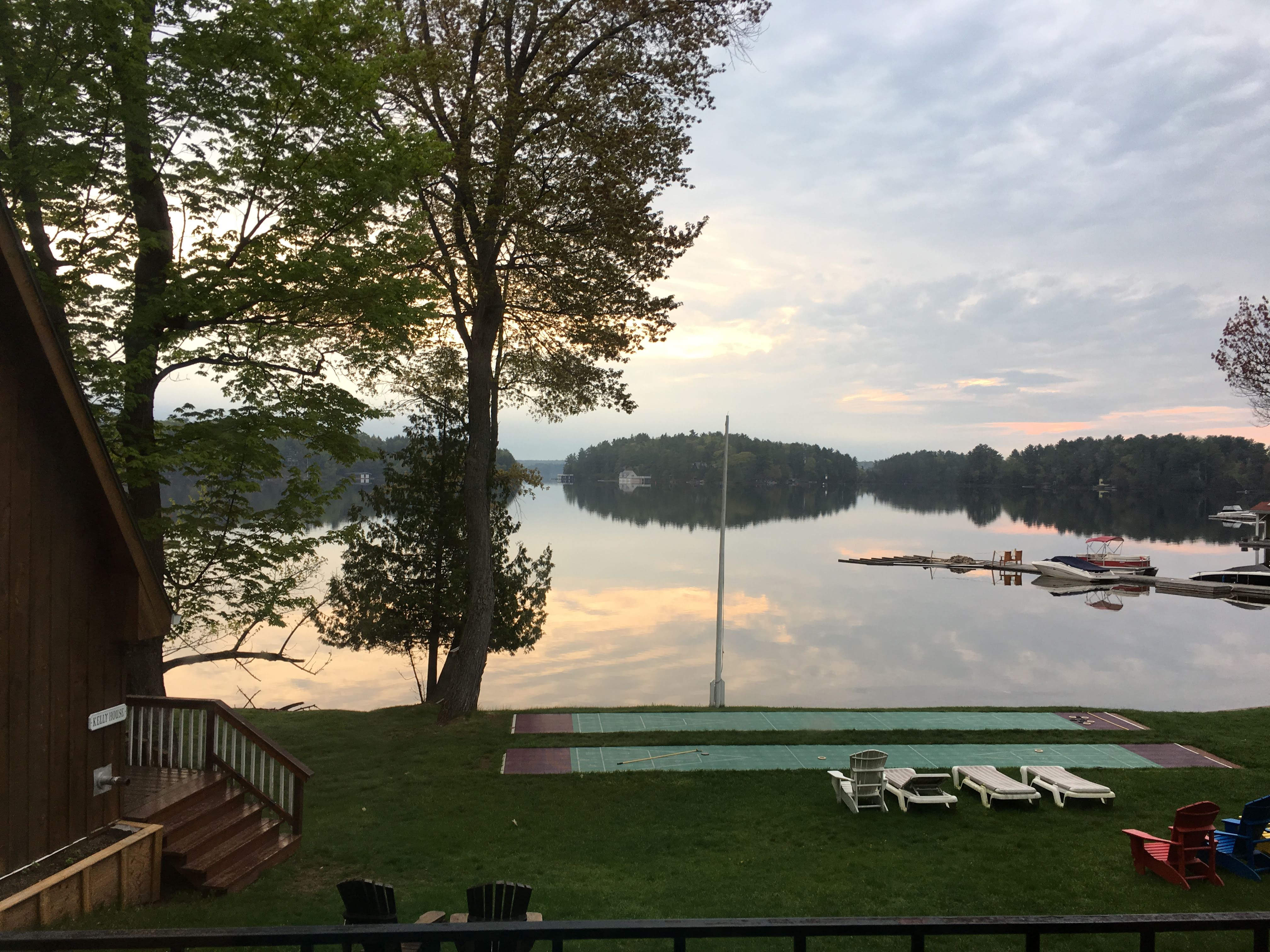14th Annual May Unconference
Hybrid - May 23-26, 2023
Thank you to all particpants!
oCUBE members can click below for the "Scribe Notes" for all sessions, where you'll find detailed notes and summaries written by volunteer notetakers throughout the UnConference
The oCUBE UnConference program is built on session ideas 'pitched' by members. The draft schedule is now available:

Active links that appear in the schedule will be available for registrants.
Summary of Sessions May 2023 Note: all times are EST Wednesday May 24th GIFT 1 (10:30 - 10:45 AM): Let’s talk about change: A global pandemic forced us to deal with more than our fair share of change, but what strategies would encourage reasonable and sustainable changes to our pedagogy as part of our ongoing professional development? COVID-19 restrictions forced many of us to “reinvent the wheel”, with radical changes to the delivery and assessment of curriculum, but as we return to more-or-less pre-pandemic conditions, are we slipping back into old and familiar routines due to the ever-present deficiency of time and resources? In this session, I would like to talk about change: let’s explore what change looks like for each of us, talk about what change involves, consider underlying theories of change, and wrap up the session with strategies to empower individual, or collective, pedagogical change that are both reasonable and sustainable. GIFT 2 (10:45 - 11:00 AM): How does our framing of biological processes impact student beliefs and what can we target for change? How we present information to students, can impact their learning and also how they view the world so let's talk about what we do, potential impacts and what changes may be useful. For instance, our recent revisions to our introductory genetics course were informed by studies showing that a complexity focused approach to genetics (as opposed to Mendelian focused) could lower students’ belief in genetic determinism/essentialism (and we're finding it worked!). BIG 1 (11:30 AM - 12:20 PM): Sharing resources and approaches to build soft-skills in large courses Comparing notes, successes, and challenges in helping students to develop study skills, teamwork habits and reflection in our courses BIG 2 (1:30 - 2:20 PM): Incorporating evidence-based methods in our courses vs. instructor sanity! How to decide which practises to use with a course? There are SO MANY evidence-based methods and practises we can use in our courses (PBL, using case studies, group work, collaborative testing, low-stakes quizzing, etc.) … and an instructor may feel obligated to use as many as possible. As some of these don’t necessarily work well together, and given the workload associated with using certain methods, how do we determine what might be suitable for a course? Can we identify some priorities or conditions to help make these decisions? BIG 3 (3:00 - 3:50 PM): The art of the *engaging* video for online or blended learning How to take your lecture videos to the next level with tips and tools for fun asynchronous student engagement (WITHOUT overworking yourself!). The goal is to build a cheatsheet documenting the best tools and important lessons we've learned about making fun and engaging videos for our students in an economic and efficient way GIFT 3 (4:00 - 4:15 PM): Active Learning and Engagement in Large Lectures It can be hard to engage students in active learning opportunities in large lectures, especially if TA and instructor time is limited. One idea is to have small, self-directed "mini-assignments" in which students find something in the real world related to the class and answer questions about it. Thursday May 25th UnKeynote (9:30 – 10:20 AM): Teaching Biology in the Age of Generative AI: Reflection and Adaptation for Learning This session will provide an overview of both the affordances and constraints of generative AI for teaching biology, including the implications for course and assignment design as well as instructional activities. Participants will be asked to reflect on the implications of generative AI for their own teaching and to identify key problems as well as potential solutions and opportunities for student learning. From reconsidering assignment tasks to how to make the best of us class time, we will explore ways to adapt how we think about our role as educators and what these conceptual shifts might mean for our teaching practices in the context of generative AI. GIFT 4 (10:30 - 10:45 AM): Post-COVID Student disengagement crisis Have students vanished from your classes? When they are there, are they doing something else? Are they coming and going during class? Is active learning more difficult to implement? If you think so, what measures have you taken and what else can we do? GIFT 5 (10:45 - 11:00 AM): Dipping my feet into Metacognitive Learning Strategies in the Classroom I attempted to provide my students with some simple strategies to help them think about their thinking (metacognition) and help them to become aware of and monitor their learning strategies. I will discuss my motivations, my approach, the results, and then crowdsource for revisions to my approach. BIG 4 (11:30 AM - 12:20 PM): From Policy to Practice: Rethinking flexibility in higher education to benefit students and educators This session will briefly share how flexibility practices in higher education have been approached and implemented over the years and the challenges that currently exist at institutions. Participants will be invited to think creatively about ways flexibility can be implemented that benefits students and is sustainable for educators and staff. BIG 5 (1:30 - 2:20 PM): Balancing flexibility & structure: Balancing flexibility & structure Elements of flexibility in courses can provide benefits to students, but attention to structure has also been recommended. What are some ways we can provide flexibility without sacrificing structure (and vice versa)? BIG 6 (3:00 - 3:50 PM): Cultivating career ready skills: weaving Experiential learning opportunities throughout the curriculum, from 2nd year and beyond Situating students’ learning in “real world” environments offers a meaningful experience that allow students to apply their knowledge, adapt to constantly changing environments and gain valuable insights. In this session I will present a scaffolded Experiential learning (EL) approach that entails sequential progression in extent and intensity. Experiential learning opportunities are introduced early on, in the second year, and are weaved throughout the program culminating in a 4th year internship course. Beyond cultivating career-ready professional skills, the EL is designed to bring awareness to “why should we care” with the goal of eliciting motivation and inspiration. GIFT 6 (4:00 - 4:15 PM): Should we embrace and incorporate AI into our regular curriculum?/Navigating the post-ChatGPT teaching landscape The use of AI programs freely available on the internet has brought forth concerns of academic misconduct, both by students and faculty. It is perhaps time to use this technology to our advantage instead of fighting against it. ChatGPT is now part of our teaching reality. I would like to discuss how we should assess learning in this new teaching landscape. Friday May 26th Open Session (9:30 – 10:15 AM): TBD This session(s) will be pitched and voted on during the UnConference. Stay tuned for links. Fix My Sh%#!! (10:15 – 11:00 AM) Feel free to add (to this padlet) a current challenge you are facing in your teaching and let’s see if together oCUBErs can figure out a solution for you! State of the oCUBE (AKA AGM) – 11:30 AM – 12:30 PM For the second time, the May UnConference will officially be hybrid! We had interest in both online and in-person attendance, so we're offering both options so that everyone interested will have the opportunity to attend in their preferred format. Regardless of how you're attending, we're looking forward to seeing everyone at the UnConference! |
IN-PERSON ACCOMMODATION AND LODGING INFORMATION
|


